LATEST NEWS


(Editor’s note: This letter first appeared on cleanandsafeports.org, coinciding with yesterday’s protests organized by the Occupy movement at ports up and down the West Coast.)
We are the front-line workers who haul container rigs full of imported and exported goods to and from the docks and warehouses every day.
We have been elected by committees of our co-workers at the Ports of Los Angeles, Long Beach, Oakland, Seattle, Tacoma, New York and New Jersey to tell our collective story. We have accepted the honor to speak up for our brothers and sisters about our working conditions despite the risk of retaliation we face. One of us is a mother, the rest of us fathers. Between the five of us we have 11children and one more baby on the way. We have a combined 46 years of experience driving cargo from our shores for America’s stores.
» Read more about: An Open Letter From America’s Port Truck Drivers »
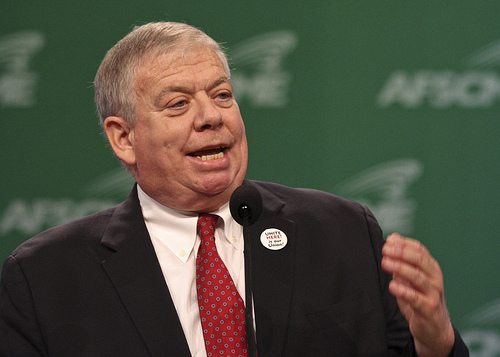

For some time Merle Haggard’s lyrics about vanishing jobs and workmanship have seemed more like a lament than the pep talk they were intended to be:
I wish a Ford and a Chevy
Would still last 10 years
Like they should . . .
When a man could still work, still would.
And are the good times really over for good?
Even with some signs that industry is making a timid return to America, organized labor is struggling to influence political events. The Frying Pan spoke about this on December 8 with UNITE HERE president John Wilhelm, shortly before he introduced honoree DeMaurice Smith, head of the NFL Players Association, at LAANE’s City of Justice Awards Dinner at the Beverly Hilton Hotel.
Wilhelm, whose union represents hospitality workers across North America,
» Read more about: John Wilhelm on Whether the Good Times Are Really Over »


The Australian woman with the large framed glasses signaled me to come over to her table, where her husband and she were having a difficult time understanding the check. It’s a conversation I’ve had many times with our overseas guests at the RH restaurant inside the Andaz Hyatt Hotel on Sunset, where I work as a waiter.
“No, Ma’am, a server’s gratuity is not included in the check.” I told her.
She looked at her husband and blushed. They had been at the Andaz for a week. They had eaten in the restaurant at night a handful of times, but they hadn’t tipped their servers anything. They were embarrassed. I was embarrassed. It’s an odd thing to guide someone on how to pay you.
Of course as an employee, I’m never allowed to tell a customer what to tip. That is an offense that I would likely get fired or disciplined for,
» Read more about: An American Waiter: Reaching the Tipping Point in L.A. »
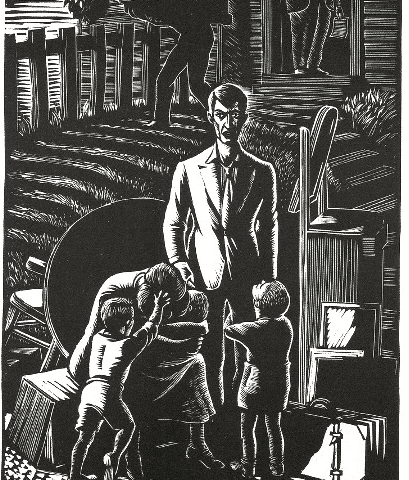
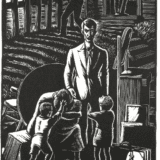
Criticized for focusing more on what it is against than what it is for, the Occupy Wall Street movement has now found an organizing issue it can embrace. Perhaps because so many Occupiers have recently been evicted from their encampments in cities across the country, they have found common cause with the growing number of American families facing foreclosure. Last week, after the Los Angeles Police Department evicted Occupy LA from the park outside City Hall, Mario Brito, one of the group’s lead organizers, said that the movement’s activists would begin to set up occupations at the homes and country clubs of major bank executives reside and to work with other groups to protest the growing wave of foreclosures.
More and more homeowners facing wrongful foreclosure evictions are taking a bold stand by resisting banks’ unfair actions. They are deciding to stay in their homes and fight. When the banks or sheriffs come knocking on their doors,


As a first-time parent of a two-year-old child I am now more convinced than ever that environment plays a major role in how we develop as humans. Not that I did not believe this prior to being a father, but nothing other than environment serves as a plausible explanation for some of my son André’s behaviors that neither my wife nor I can even begin to comprehend.
One of those behaviors is, ironically, his utter infatuation with trash trucks. I say ironically not only because neither my wife nor I nor any close relative care much for trash trucks but also because I happen to be the community organizer for Don’t Waste LA. Started last year, Don’t Waste LA is an effort to reform the commercial and multi-family waste industry in Los Angeles in a way that will, among other things, reduce trash truck traffic in the city. So trash trucks are not all that exciting to my wife and me,


(This post by the California Labor Federation’s Steve Smith first appeared at Labor’s Edge.)
A new report released today by the AFL-CIO shows that more than 305,000 Californians will lose their unemployment benefits on December 31 if Congress fails to act to extend unemployment insurance.
Electrician Alexander Stewart, who has been out of work since July 2010 and will lose benefits if Congress fails to act by the end of the year:
We elect Congress to look out for the interests of everyday people. It’s appalling that elected officials would let petty politics stand in the way of extending unemployment insurance, the only thing keeping my family and so many others afloat in these tough times.
In California as well as across the country, jobless workers and their communities will be holding actions Thursday to call attention to the ongoing jobs crisis and to urge Congress to take immediate action to extend unemployment benefits.
» Read more about: Unhappy New Year for Jobless Californians »

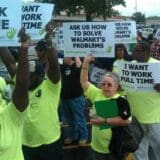
More than one million Americans work at Walmart. I am one of them. I started at the Mount Vernon, Wash., store in November of 1999 as a sales associate in sporting goods and worked my way up to an assistant manager. After a couple of years I no longer had any pride in my job. I felt like I was treating people like property instead of employees. Now I work as a sales floor associate and a front-end cashier.
Many of my co-workers became homeless because they had their hours cut. Many associates are living in poverty and are afraid to speak out and ask for more hours. They fear retaliation.
You’ve heard that story before. But here’s something new. I have joined the Organization United for Respect at Walmart, OUR Walmart for short. It is a new organization of former and current Walmart associates who are coming together to get respect at work from one of the nation’s largest employers.
» Read more about: Don’t Discount This: Walmart Worker Issues Challenge to Her CEO »
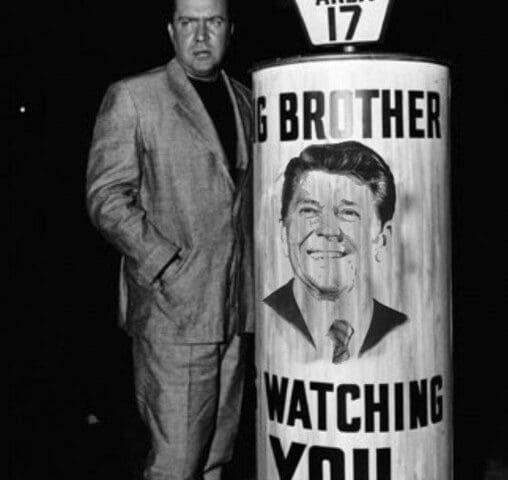
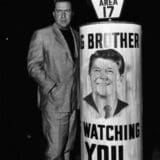
Frank Luntz, the Republican pollster and messaging guru, gave a recent talk where he described his 10 biggest Do’s and Dont’s for talking about the economy in the post-Occupy Wall Street environment. It’s worth reviewing these 10 points and reflecting on what Luntz’s insights on behalf of the 1% tell us about how we can successfully talk about the issues we care about, on behalf of the 99%.
The main thing – the frightening thing – is that Luntz has a history of actually succeeding at changing the debate in America. Why? Because Republicans like Luntz are masters of the reductive fear phrase and it comes out all over his suggestions. These are the guys, after all, who turned inheritance duties into “death taxes” and from that, advisory health committees into “death panels.” But they’re clearly on the defensive here – for the time being.
Luntz begins his talk to the Republican base by admitting,


A little while ago, after the Long Beach City Council’s Elections Oversight Committee decided to consider revising the city’s lobbying ordinance to include the kind of 501(c)3 nonprofit organizations that I work with, nonprofits and their members filled the Council chambers to defend the ordinance as it was written, nonprofit exemption intact.
The distinctions between our work of and that of paid lobbyists seemed obvious. For starters, nonprofits are working for people not – um – profit. From the arts to autism, good jobs to good mental health, sustainable food to affordable housing, nonprofits representing a broad swath of Long Beach residents and issue areas drove the message home: “We’re not lobbyists.”
Beyond wearing stickers saying “people are our special interest,” each speaker teased out more of the things that set us apart from lobbyists. Unlike lobbyists, nonprofits have several federally regulated checks in place to ensure that the issues we work on and our funding streams (among many other things) are transparent to the public.
» Read more about: Our “Special Interest” Is People: Long Beach Nonprofits Draw a Line in the Sand »


What is the trucking industry response to claims that port drivers are actually employees who have been stripped of their basic rights by trucking companies? Robert Digges, a spokesman for the American Trucking Associations, tripped on his own tongue on a CBS national news segment when he tried protesting the idea that trucking companies are cheating workers – and it’s getting picked up on blogs like the Daily Kos.
“They (trucking companies) believe they get a more productive employee – excuse me a more effective worker – a worker who is efficient, who has some skin in the game.”
So, the industry that dismantled the Los Angeles Clean Truck Program finally lets the truth slip: port truck drivers are actually employees who have had their rights stripped from them by greedy port trucking companies seeking to pad their bottom line.
“As long as we are independent contractors (the company) doesn’t have to cover benefits,
» Read more about: Trucking Industry Exposed for “Ripping Off” Workers and Tax Payers »
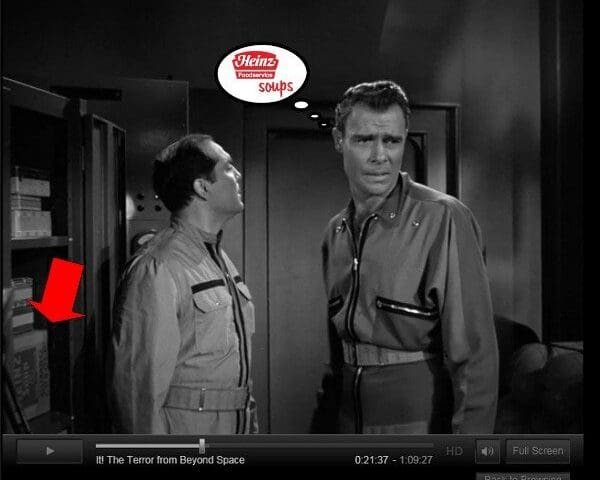
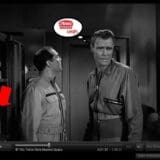
The other day I was streaming It!, an old science fiction film, and saw something odd on my computer screen. There, in the storage hold of the rocket ship returning from Mars, sat a crate of Heinz soup cans. The box was barely visible – blurry and jammed in the corner of a locker, next to all the cartons of cigarettes the crew members were smoking on their trip back to Earth. Still, we’re trained to notice product logos and I couldn’t miss Heinz’s distinctive lettering on its case of Creole Gumbo.
I was shocked that Heinz had even sold soup in 1958, when the film was made – let alone that they would figure in the story’s Tomorrowland of 1973. I did what any futuristic earthling would and Googled “heinz soup.” Sure enough, the company did sell a supermarket line in the 1950s, but eventually got out of the business except for its current Heinz Foodservice trade of selling tub-sized containers of Tomato Florentine to institutional clients.


Every few days I drag my trash and recyclables out to the big gray dumpster and blue bin in the back of my apartment complex. The materials get picked up, the bins emptied, and they’re out of sight and out of mind. But where does it all go? Few of us actually know where our piles of trash and recyclables end up, with whom they come into contact and whom they impact along the way. While it may seem as though our trash magically disappears each week after the point of collection, it often ends up burned or buried near schools or homes in our city – or it may take a long journey, ending up outside of our communities, regions, state or even country.
The first step in raising our consciousness about our trash problem is to track where our waste goes. Trash | Track, a project out of MIT that builds on previous work of the SENSEable City Lab and is inspired by the NYC Green Initiative,
» Read more about: On the Trail of Trash: Tracking Our Disposable Society »
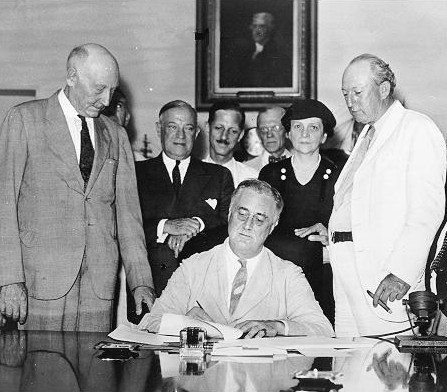
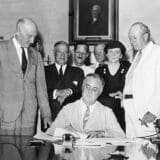
As Janet Heinritz-Canterbury of the California Alliance for Retired Americans explains it, retirement in America has historically rested on a three-legged stool – the pension from your job, income from your own investments and assets, and Social Security.
But where are most Americans today in their ability to even contemplate retirement? Most of us no longer get pensions from our jobs; what investments we may have are losing money while home prices have declined; and now some members of Congress and possibly President Obama are out to substantially lower Social Security benefits.
According to the American Association of Retired People (AARP), a frightening 35 percent of Americans over 65 currently rely only on Social Security (an average person gets benefits of $14,000/year) to survive. On January First of this year and continuing for the next 19 years, an additional 10,000 people A DAY will be turning 65.
» Read more about: Retirement: Sitting on a One-Legged Stool »


Recently, we noted that our friends at American Rights at Work called for a boycott of Amazon.com. As friend-of-this-blog and renaissance-man-about-town Joshua Joy Kamensky notes, however, we need to be more careful with the B-word.
Boycotts are ubiquitous. Progressives boycott Wal-Mart because of its anti-worker practices and its impact on local economies. Conservatives boycott stores that say “Happy Holidays” instead of “Merry Christmas.” Los Angeles boycotts (kinda sorta) the state of Arizona over the anti-immigrant SB1070. Animal rights activists boycott Nestea for animal testing. Anti-Islamists boycott halal turkeys. Every time some politician says something idiotic or offensive, people dig up the donor list to that politician, and boycott the corporate sponsors.
But sometimes things get confusing. Are we boycotting Home Depot to get it to stop using old-growth redwoods,


It wouldn’t be Christmas without basketball. So goes the thinking in the NBA, as the players and owners reached agreement over the holiday weekend on a new six-year deal that will give us a shortened, 66-game season and the all-important marquee games on Christmas Day.
For all the discussion of the issues the past few months, writers have been quick to move from analysis of Basketball Related Income to breaking down the 2011 (barely)-2012 season. In part, that’s because all the details aren’t in, but here are a few links for your reading pleasure.
First up is a memo from National Basketball Players Association head Billy Hunter explaining the deal. Take the cheerleading with a grain of salt, of course, since Hunter’s been under fire and needs to tell players what they won after giving up some paychecks. (This is what everyone says,
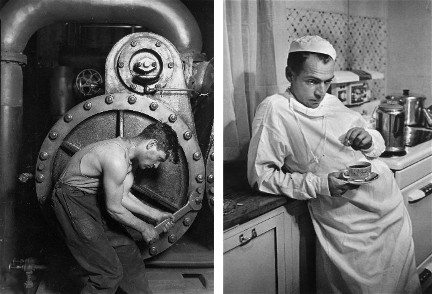

“It’s not brain surgery.”
My cousin’s husband, Keith, says this to me a lot. He says it whenever he’s giving me complicated instructions on how to tackle some grueling home-repair process, usually one involving multiple steps and materials and equipment I’ve never heard of. And at that point I always picture myself standing over some inert patient on a gurney, bone saw in hand, wondering if I should go ahead and cut into their skull or wait for a trained professional, because as far as I’m concerned what he’s describing might as well be brain surgery, it sounds that difficult.
But for Keith it’s really not difficult. He’s done this kind of thing for years. He worked in residential construction for more than a decade and has remodeled every house he’s ever owned, generally more than once. He takes his own expertise and know-how completely for granted,


I don’t believe in empires. They don’t turn out well. They may last for a while – even a long while – but ultimately they collapse, and they don’t make most people’s lives much better in the process. Think Rome or the Ottoman Turks or the Spanish or the Brits. There are many reasons for the sad course of empires, but to me it’s about institutions.
We human beings organize themselves in one of two ways — as institutions or as associations. Institutions are usually big organizations that do big jobs where people get paid to do the work. Like governments and corporations. These institutions operate on protocols, make or sell lots of the same things, and need many customers or clients or constituents. Institutions run from the top down, which is why I think of them as triangles – the power of decision-making happens at the top, the rest of us follow the rules.


Fun fact: L.A. leads the nation in jobs—just the kind that most people don’t think of as jobs. We’re the national leader in “nonemployers:” entities relying on independent contractors rather than employees. As economist Jack Kyser explained in 2006, “a lot of people want to have a business but don’t want the headaches of actually having to employ people.” The Times cited Kyser in explaining that “businesses become nonemployers to avoid the costs of workers’ compensation, paid leave, health insurance and state taxes.”
In many cases this sort of practice is, not to put too fine a word on it, illegal. Starting in just a few weeks, though, the state has a powerful new tool to deal with these lawbreakers. SB 459 goes into effect on January 1, 2012, and it levies large fines against employers who willfully misclassify workers as independent contractors to avoid their legal and tax responsibilities.
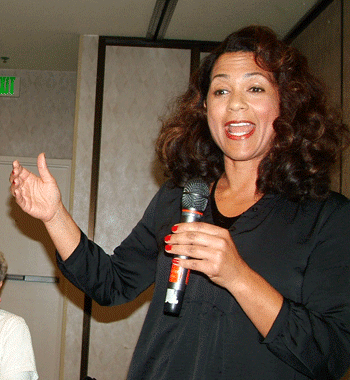

(This feature first appeared on L.A. Progressive. Reposted with author’s permission.)
Having captured the public’s rapt attention in just two short months but now facing increasingly well-coordinated and sometimes brutal police crackdowns, the Occupy Movement faces hard questions about its lasting impact. What will Occupy 2.0 look like, many want to know, and how will it get there?
If a meeting this past weekend between representatives from a half dozen Occupy encampments in California and perhaps 200 members of the California Progressive Caucus is any guide, the Occupy Movement has already enlisted several generations of progressive activists who are eager to support, leverage, and amplify the Occupiers’ ground-breaking work.
The meeting was, indeed, a kumbaya moment, one that suggests that the movement has embedded itself deeply into the progressive political psyche.
Recertification Battle
Gathering at the California Democratic Party’s Executive Board meeting this past weekend in Burlingame,
» Read more about: “Occupy” Occupies California’s Democratic Party »
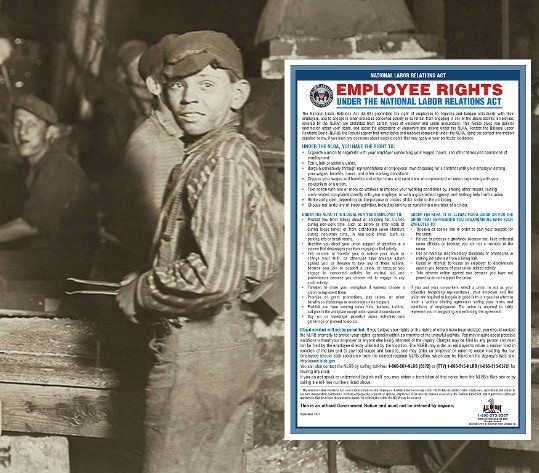

Earlier this month, 36 House Republicans filed an amicus court brief to support corporate America’s war on workers’ rights. They are embracing a suit filed by the Chamber of Commerce, the National Association of Manufacturers, the National Restaurant Association , and other business lobbies to block a new ruling by the National Labor Relations Board.
This ruling, by one of those out-of-control federal government agencies, could be devastating to the job-creating corporations that are the engine of the American economy. Just listen to those who should know:
“The National Labor Relations Board (NLRB) is causing great uncertainty among manufacturers at a time when our economy is struggling to recover,” Jay Timmons, President and CEO of the National Association of Manufacturers, recently warned.
“Just when we thought we had seen it all from the NLRB, it has reached a new low in its zeal to punish small business owners,”
» Read more about: Corporations See End Times in NLRB Poster »